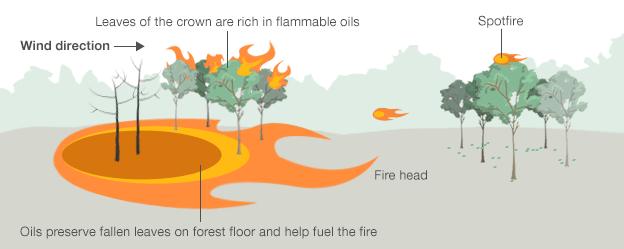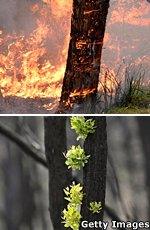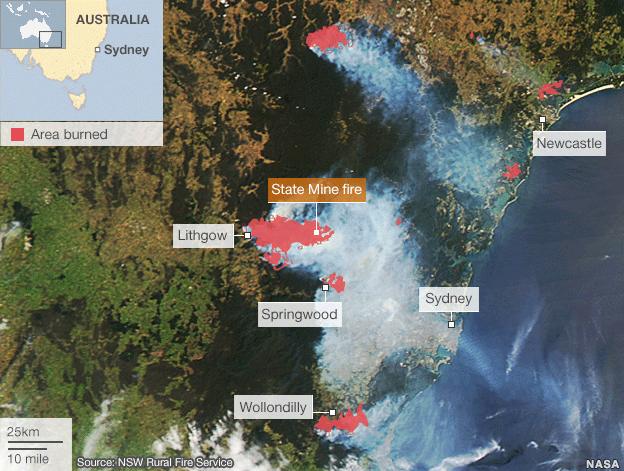Fire threat to Australia's Blue Mountains 'averted'
- Published
The BBC's Jon Donnison: "Wind has been the biggest problem for fire crews today"
Australian fire officials say the threat to the Blue Mountains west of Sydney "has been averted" for the day, but warn the crisis is far from over.
New South Wales Rural Fire Service Commissioner Shane Fitzsimmons said residents would be able to return to their homes.
But he warned that fresh challenges lay ahead in the coming days amid unfavourable conditions.
In total, 73 fires are burning across the state, 29 of which are uncontained.
Meanwhile, a fire service investigation has concluded the largest of the fires in the Blue Mountains - State Mine near Lithgow - was caused by explosives training at an army range at Marrangaroo last Wednesday.
Mr Fitzsimmons confirmed the cause of the fire was "on a live firing range as a result of the detonation of some ordnance", but he said: "Any suggestion that this practice would be on par with someone deliberately lighting fires, reckless or criminal, is outrageous".
The defence department has not yet commented on the findings, but acknowledged at the weekend that it could have been the cause.
The findings have angered Blue Mountains Mayor Mark Greenhill who said the army "should not have been firing" on such a hot, dry day.
Hundreds of homes have already been destroyed as more than 3,000 firefighters battle to contain the bushfires in Australia's most populous state.
'Stay vigilant'
Fire officials had warned that Wednesday's combination of high temperatures, low humidity and strong winds could lead to more devastation.
But fire chiefs confirmed by the end of the day that not one home had been lost.
"If you have been someone that has chosen to depart the Blue Mountains today, to be out of harm's way, then it would be safe to head back home tonight because the risk has been averted," Mr Fitzsimmons said.
A drone captured the scene in the fire-hit city of Lithgow
Fire chiefs say a combination of back-burning - the controlled burning of areas with the aim of depriving a fire of fuel - building lines of containment and strategic planning had paid off.
In particular, firefighters on Tuesday merged the State Mine fire with one at Mount Victoria to prevent them linking up with the third. "It is absolutely wonderful it did not run," Mr Fitzsimmons said.
But he warned people to remain extremely vigilant.
"There are still fires flaring up," he said. "There's every prospect we're going to see some more."
Many schools in the Blue Mountains are expected to remain closed on Thursday. A major highway through the region is also closed.
Emergency alerts remain in place near the city of Newcastle, north of Sydney. An emergency alert in Springwood, to the west, has been downgraded to a watch-and-act alert.

How eucalyptus trees help bushfires to spread


Ninety percent of Australia's forests are eucalyptus trees that are adapted to bushfires. Eucalyptus leaves are rich in flammable oils and many varieties also have trunks that have evolved to burn quickly and later sprout new growth from buds in the bark (right)
The fastest-moving and most dangerous part of the fire is known as the "head". Areas ahead of the fire are warmed as it approaches and flying embers blown by the wind spark "spotfires", which cause it to leap further ahead
Fires travel faster uphill than downhill, as the heat and smoke rise, heating areas higher up the hill. Wind currents also tend to blow uphill, pushing the flames further. Burning embers may roll downhill, starting new fires

Earlier, new Prime Minister Tony Abbott hit back at comments by UN climate chief Christiana Figueres linking bushfires to global warming and criticising his decision to repeal a tax on carbon emissions introduced by the previous government.
"The official in question is talking through her hat," Mr Abbott told local media.
"Climate change is real, as I've often said, and we should take strong action against it. But these fires are certainly not a function of climate change - they're just a function of life in Australia."
Mr Abbott, who took office in September, has drafted legislation to repeal the carbon tax, which imposed a levy on the country's 300 biggest polluters.
The new prime minister, who says the tax cost jobs and forced energy prices up, wants to introduce a Direct Action plan under which farmers and industry will be paid to act to reduce emissions.

- Published23 October 2013
- Published23 October 2013
- Published23 October 2013
- Published23 October 2013
- Published23 October 2013
- Published21 October 2013